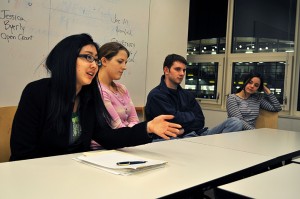By Kelsey Roebuck
The Career Development Office (CDO) is prepared to handle all degrees of stressed out students, from those whose résumés are blank sheets of paper to those who cannot decide which internship is for them. As the application season ramps up, it may be useful to know just how much Grinnell College and the CDO can do for you.
“I think what’s great about the Grinnell liberal arts education is that it helps students integrate in different knowledge,” said Abby Trout, Career Counselor. “That’s really attractive to employers because it brings a lot of innovation and creativity.”

Needless to say, having the skill set for the ideal internship is not necessarily enough to ensure that the opportunity falls into your lap. That is where the CDO steps in to walk students through every part of the process.
The CDO provides students with a multitude of different databases and programs that connect interns with potential employers. A popular resource is Grinnellink, the system that connects roughly 25 students a year with alumni who offer Grinnell-exclusive internship opportunities. It also allows students to apply for funding for their unpaid internships. While participating in Grinnellink has the benefit of serving a much smaller applicant pool, students should not despair that the deadline passed on Feb. 18. The CDO offers a number of other opportunities through their online databases.
The College’s unique database, PioneerLink, contains roughly 300 internships, all of which have been reviewed by CDO personnel to ensure quality. Employers who post internships on PioneerLink do so because they are particularly interested in liberal arts students.
For even more opportunities, the Liberal Arts Career Network (LACN) is composed of databases like PioneerLink from 30 different liberal arts schools. The roughly 3,000 jobs and internships available on this database may be more overwhelming, but they provide more varied opportunities.
“What’s nice about LACN is that it’s a broader base regionally, where internships are located,” Trout said. “This is great for students who are wanting to get out of the Midwest—LACN has a lot more opportunities that are outside of this region and even outside of this country.”
Along with other national and international databases, Trout highlighted interships.com, for which Grinnell has a username and password, as well as idealists.org, which specializes in non-profit internship opportunities.
Writing a professional résumé and application letters is one of the first steps to getting any internship. Career Counselors Trout and Jeremy Reed are available to go over both submission requirements until they portray exactly the type of intern the student will be. Students can drop in to the CDO on Tuesday and Thursday afternoons for assistance or schedule an appointment.
Still, even with all of the resources available, it is difficult to figure out when it is important to start thinking about an internship. These uncertainties are exactly the type which can be answered at CDO information sessions like last Tuesday’s “What Should I Do as a 3rd Year Student?”
“Your first year it’s something to think about,” Trout said. “We see more students getting internships their second year. … I think your second year is a good time to really start considering it. By your third year, you should definitely be getting ready to put an internship on your plate for the summer.”
Tuesday’s Internship Panel presented four students who have benefited from a grant or endowment that funded their unpaid internship. The deadline for grant or endowment applications is April 15, and requires a signature from the supervisor of the internship. In order to qualify, the internship must require the student to work for 40 hours a week.
Alison Liu ’13 was awarded the Lilly Grant, for internships with a religious connection, and the grant funded her trip to Taiwan. The Rosenfield Grant enabled Joe Maloney ’12 to live in downtown Chicago and commute to his internship in microfinance. Jessica Byerly ’11 used the CDO Open Grant to fund an unpaid internship in her hometown. Courtney Sheehan ’11 found both of her internships by reaching out to corporations in the area she wanted to work. She received both the Writing Grant as well as the Wilson Grant.
Regardless of whether a student’s internship is self-designed or organized directly through the CDO, the experience is certainly a constructive one.
“Internships are important for students,” Trout said. “It gives students a good sense of what their strengths are, what their interests are, and what their skills are. … It gives students a really good look at what they like and what they like about it.”


















































